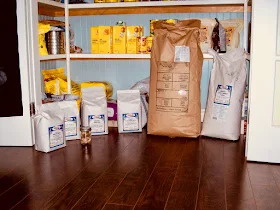 |
Junk Food Subtraction - like many other things, the less the better.
|
A consumer life is a life of addition, always adding more and more and more to our lives. Sooner or later, we have no space left for living.
A simple life, on the other hand, is a life of subtraction. It is a lifelong process of subtracting those things that get in the way of living an authentic life. And there are an infinite number of those things that can get in the way.
The subtractive mindset whittles away at the infinity of distractions, and creates space to fulfill our personal potential as human beings. It allows us to expand into a wondrous and beautiful Universe, merging with the joy of Creation.
And how do you get there? Keep subtracting.
I am working my way down to owning only two pairs of underwear, for example. Do I really need to own 20 pairs? Do they make my life better? I don't see how.
However, the most important item to subtract along the path to the simple and beautiful life is not underwear. It is that blindfold of consumerism that hides all that is real and true and precious in this world.
Under an eyes open fair and sensible system, we could be living in a paradise right here on Earth. Now. All of us. We already have every single thing we need.
Everything, that is, except the cooperation of those that want to keep us blind. They desperately want our eyes closed to the lies and corruption that keep humanity from the better world we all deserve.
Doing some take away, and removing the blinders is the first step toward freedom and change, both personal, and cultural.
When we are able to see our life in a totally new way, one without the constraints and boundaries of conventional thinking, we can see the lies, illusions, and wishful thinking that have been hiding in plain sight all along.
A simple life remains a challenge. Just living is a full time job. Why add a bunch of extra complications that only make us unhappy in the end?
It is simple math. Perpetually adding to the misery with more, more, more is not the way to go.
Any time is a great time to subtract, subtract, subtract.










